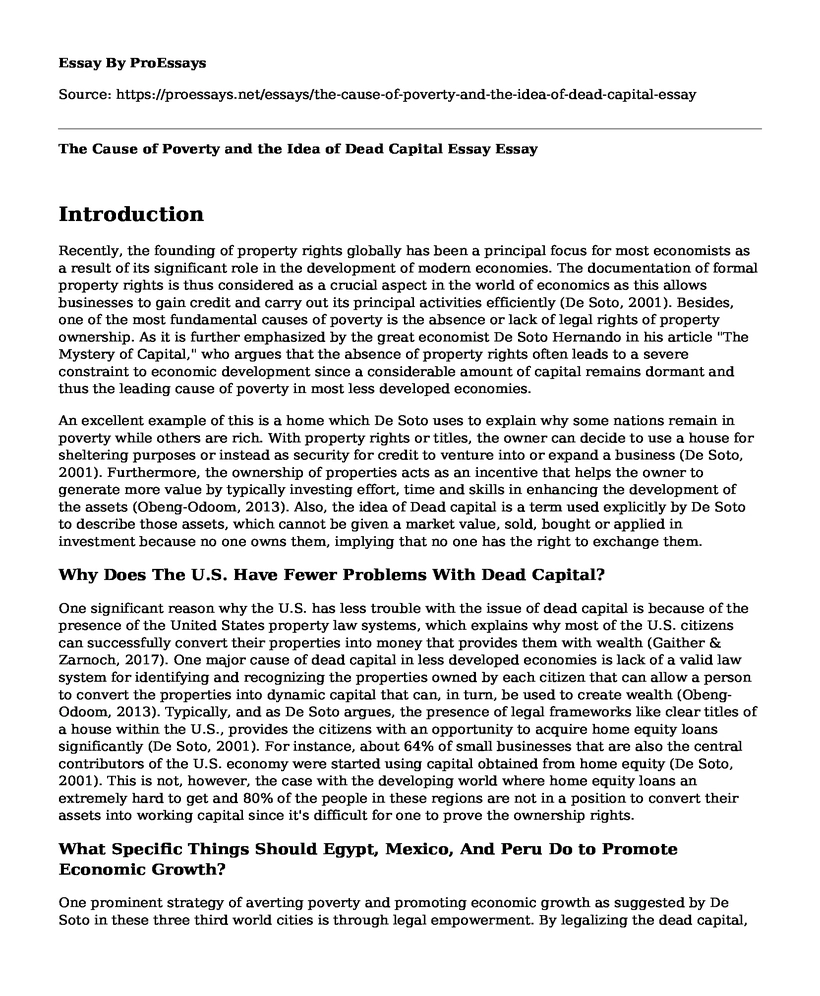Introduction
Recently, the founding of property rights globally has been a principal focus for most economists as a result of its significant role in the development of modern economies. The documentation of formal property rights is thus considered as a crucial aspect in the world of economics as this allows businesses to gain credit and carry out its principal activities efficiently (De Soto, 2001). Besides, one of the most fundamental causes of poverty is the absence or lack of legal rights of property ownership. As it is further emphasized by the great economist De Soto Hernando in his article "The Mystery of Capital," who argues that the absence of property rights often leads to a severe constraint to economic development since a considerable amount of capital remains dormant and thus the leading cause of poverty in most less developed economies.
An excellent example of this is a home which De Soto uses to explain why some nations remain in poverty while others are rich. With property rights or titles, the owner can decide to use a house for sheltering purposes or instead as security for credit to venture into or expand a business (De Soto, 2001). Furthermore, the ownership of properties acts as an incentive that helps the owner to generate more value by typically investing effort, time and skills in enhancing the development of the assets (Obeng-Odoom, 2013). Also, the idea of Dead capital is a term used explicitly by De Soto to describe those assets, which cannot be given a market value, sold, bought or applied in investment because no one owns them, implying that no one has the right to exchange them.
Why Does The U.S. Have Fewer Problems With Dead Capital?
One significant reason why the U.S. has less trouble with the issue of dead capital is because of the presence of the United States property law systems, which explains why most of the U.S. citizens can successfully convert their properties into money that provides them with wealth (Gaither & Zarnoch, 2017). One major cause of dead capital in less developed economies is lack of a valid law system for identifying and recognizing the properties owned by each citizen that can allow a person to convert the properties into dynamic capital that can, in turn, be used to create wealth (Obeng-Odoom, 2013). Typically, and as De Soto argues, the presence of legal frameworks like clear titles of a house within the U.S., provides the citizens with an opportunity to acquire home equity loans significantly (De Soto, 2001). For instance, about 64% of small businesses that are also the central contributors of the U.S. economy were started using capital obtained from home equity (De Soto, 2001). This is not, however, the case with the developing world where home equity loans an extremely hard to get and 80% of the people in these regions are not in a position to convert their assets into working capital since it's difficult for one to prove the ownership rights.
What Specific Things Should Egypt, Mexico, And Peru Do to Promote Economic Growth?
One prominent strategy of averting poverty and promoting economic growth as suggested by De Soto in these three third world cities is through legal empowerment. By legalizing the dead capital, it would help to protect the ownership rights and provide a more natural way of carrying out free market transactions (Obeng-Odoom, 2013). According to De Soto, 53% of city dwellers in Peru, as well as 81% of citizens in the countryside, live in a housing scheme that is dead capital or in extralegal dwellings (De Soto, 2001). In Egypt, the approximate value of dead capital in real estate according to a tally conducted by the Egyptians is 240 billion dollars, which is about fifty-five times the total value obtained from the foreign investors in Egypt. The situation is however similar in the Mexico city where the majority of individuals work in the extralegal sector which includes the city's unregistered shops, streets, factories and also their homes (De Soto, 2001). However, the exemption of land taxes in these countries is a massive disadvantage since it is the Government's mistake that it has failed to put the lands under regulations. As a result, their housing properties do not bring any value to them because they cannot invest in these lands due to the lack of titles and ownership rights (Gaither & Zarnoch, 2017). This also forms the primary reason for the deteriorating economic conditions in these countries as they cannot contribute any revenues through land investments thus hindering the development of the economy.
References
De Soto, H. (2001). The mystery of capital. Finance and Development, 38(1), 29-33.
Gaither, C. J., & Zarnoch, S. J. (2017). Unearthing 'dead capital': Heirs' property prediction in two US southern counties. Land Use Policy, 67, 367-377.
Obeng-Odoom, F. (2013). The mystery of capital or the mystification of capital? Review of Social Economy, 71(4), 427-442.
Cite this page
The Cause of Poverty and the Idea of Dead Capital Essay. (2022, Dec 06). Retrieved from https://proessays.net/essays/the-cause-of-poverty-and-the-idea-of-dead-capital-essay
If you are the original author of this essay and no longer wish to have it published on the ProEssays website, please click below to request its removal:
- Feminism and Crime Essay
- Immigrants and Their Struggles Essay Example
- How Trauma from Intimate Partner Violence, PTSD, and Depressive Disorder Affects the Human Brain
- Is the Gender Gap Persistent in America? - Research Paper
- Research Paper on Anxiety in Chinese Sports
- Paper Example on African Americans' Fight for Equality: A Historical Overview
- Paper Example on DRA PS-Human Resources Management







